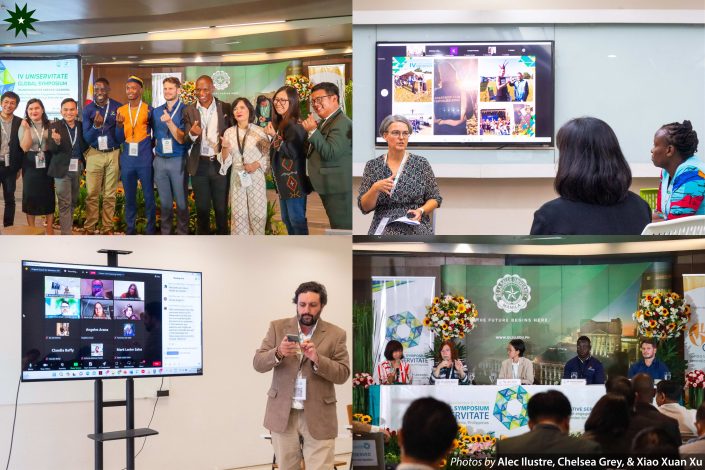Members of the academe from 42 participating nations gathered in person at the Verdure, Henry Sy Sr. Hall and virtually on Facebook Live last November 8 and 9 for the fourth Global Symposium of Uniservitate, a global network of academic institutions and partners that aims to promote and institutionalize service-learning in Catholic higher education institutions.
The event featured talks, panel discussions, and spiritual reflections bounded by its theme, “Transformative Service-Learning: Cultivating Student Engagement, Community Partnership, and Spiritual Reflection for Social Change.”
Transformational learning
The two-day event kicked off with an opening ceremony that featured welcoming remarks from leaders of Uniservitate member institutions. Among them was University President Br. Bernard Oca FSC, who related the Lasallian core values with the theme of the discussion.
“I invite everyone to learn from one another, to share experiences, practices, and challenges, and to make this program a mutually empowering experience for a better world with service-learning as pedagogy,” Oca urged.
Maria Neves Tapia, founder and director of Centro Latinoamericano de Aprendizaje y Servicio Solidario, headed the ensuing plenary session centered on the sustainable impact of transformative service-learning experiences on society, succeeded by the event’s first panel discussion centered on cultivating student engagement for quality education and social impact.
Uniservitate Academic Sounding Board member Dr. Andrew Furco stressed that not all service-learning experiences are the same in their intentions, underscoring the importance of considering the nature of the service and the students’ preference to allow them to better spark social change.

Fostering community change
The impacts of service-learning in being empathic to others and in sparking change, as well as quality education opportunities opened by transformational service-learning, were also touched upon. “I put forward that transformational service-learning can develop universal citizens who are broadly skilled, broad minded, and committed to a better world,” said Matthew Pink, an associate director of ACU Engagement at Australian Catholic University.
Thomas Nyawir, founder and CEO of community-based organization Mirror of Hope, and Anne Chen, a Fu Jen Catholic University student, followed with discussions on their experiences in service-learning and the help it provides in establishing other community-based programs. Nyawir highlighted that community programs should be “giving people a hand up, as opposed to giving them handouts.”
A concurrent session was then conducted to discuss papers on student engagement and student protagonism, stressing that students should be the protagonists of their education. This was succeeded by a panel discussion on transformative learning through community partnerships being a catalyst for changes in society.
Dr. Howard Rosing, executive director of the Steans Center at DePaul University, emphasized that “social change work in communities is political” and is embedded in the political context of our history.
Proceeded by Dr. Luisa Mota Ribeiro, professora auxiliar at Universidade Catolica Portuguesa; Chantal Jouannet Valderrama, director at Center for Teacher Development of Pontificia Universidad Católica de Chile; and Corazon Salvador, principal at the Philippine National School for the Blind. The speakers emphasized the importance of connecting with community partners for the development of successful service-learning programs and its impact on the partners, students, and educators.
A solidarity night among participants, which saw performances by organizations under the Culture and Arts Office, capped the first day of the event.
A social responsibility
The symposium’s second day opened with concurrent sessions discussing community partnership, followed by the event’s final panel discussion which focused on the relationship between spiritual reflection and social change.
Br. Michael Valenzuela FSC tackled spiritual reflection using James Loder’s logic of transformation, which illustrates how learners experience personal and ministerial formation following the image of Jesus Christ. He expounded that educators must provide learners the means to abide by the Holy Spirit as it “plays a more important role in education than we think.”
Service learning also aims to bridge the gap between theory and experience through cognitive and affective spiritual reflection, according to Uniservitate Academic Sounding Board member Dr. Mercy Pushpalatha. She believed this approach would nurture students to be “dedicated, ethical, and compassionate” leaders.
Meanwhile, Dr. Juan Etxeberria, rector of the University of Deusto, and Br. Alejandro Cerna FSC, dean of education at Bethlehem University, dwelled on service-learning being driven by Ignatian spirituality and service-learning that makes education more relevant to the world.
In a concurrent session on utilizing spiritual reflection, Dr. Yuliia Vintoniv from the Ukrainian Catholic University highlighted the crucial role of educators in fostering a growth-centered environment—both spiritually and transformatively—through service-learning. Vintoniv raised that educators must be proficient in community engagement and socio-cultural and political issues to reach this goal. “Educators should serve people beyond just academic excellence,” she reflected.
Closing the two-day symposium, Vice President for Lasallian Mission Fritzie Ian de Vera revisited the “gift of Uniservitate” in integrating service-learning to transform communities. “The ability of our students to connect what they have learned and process it using the view of social realities and needs of humanity will make them value their education and find their purpose and vocation,” de Vera concluded.
